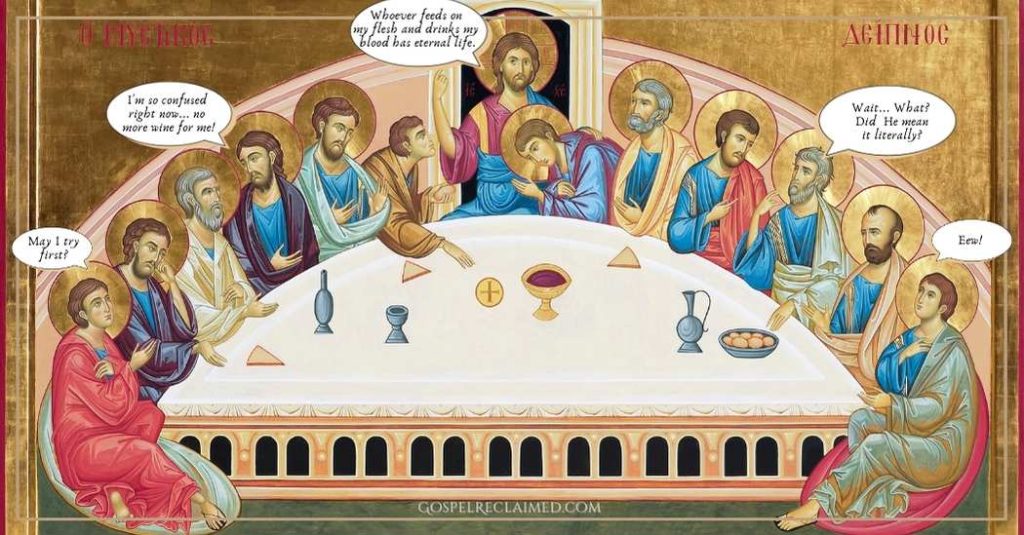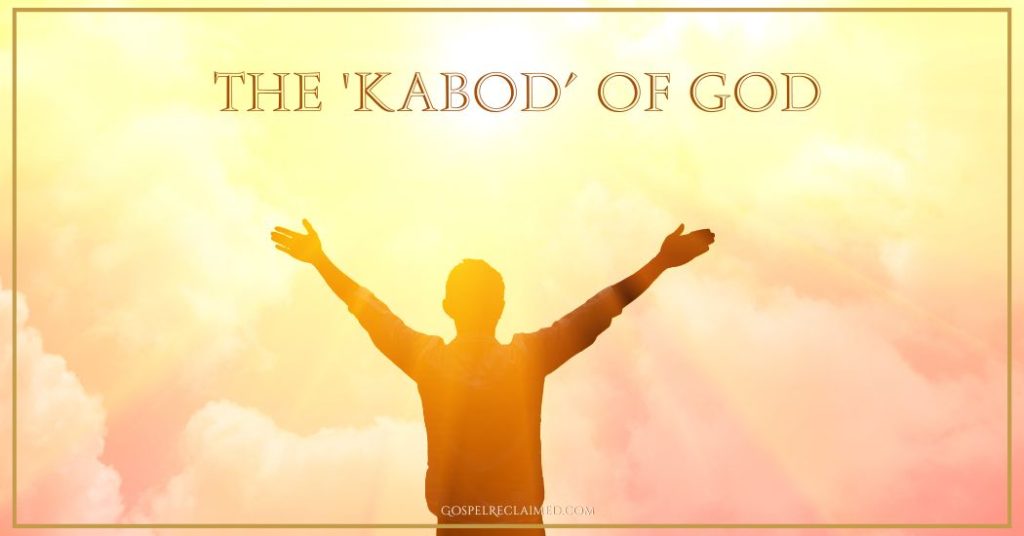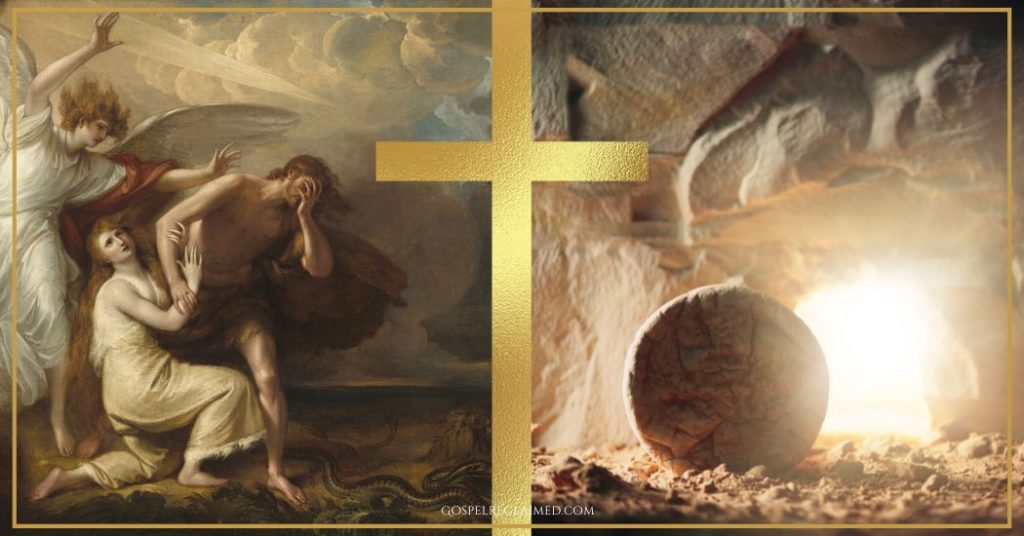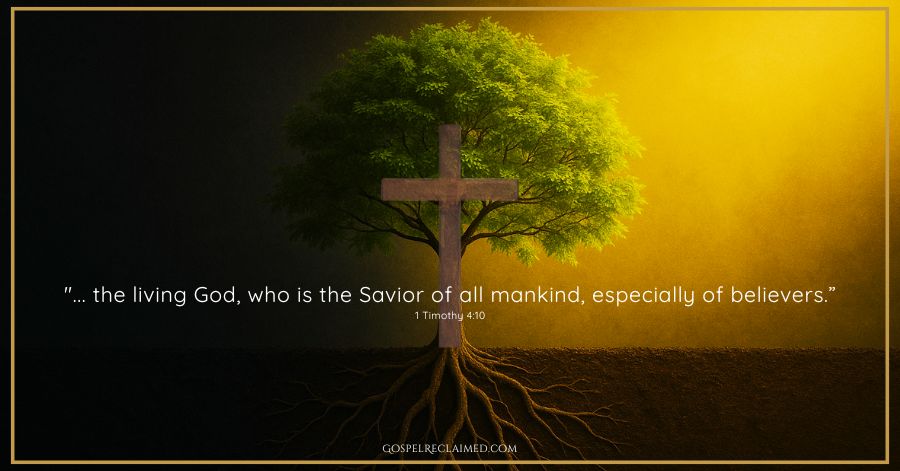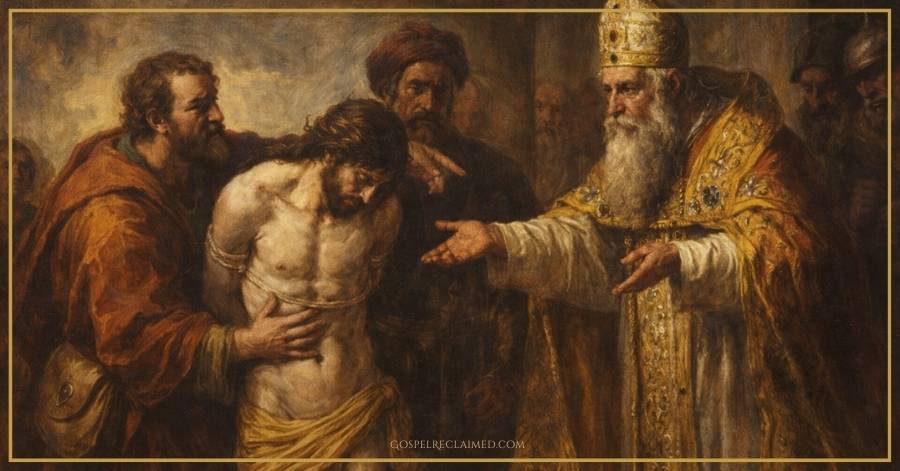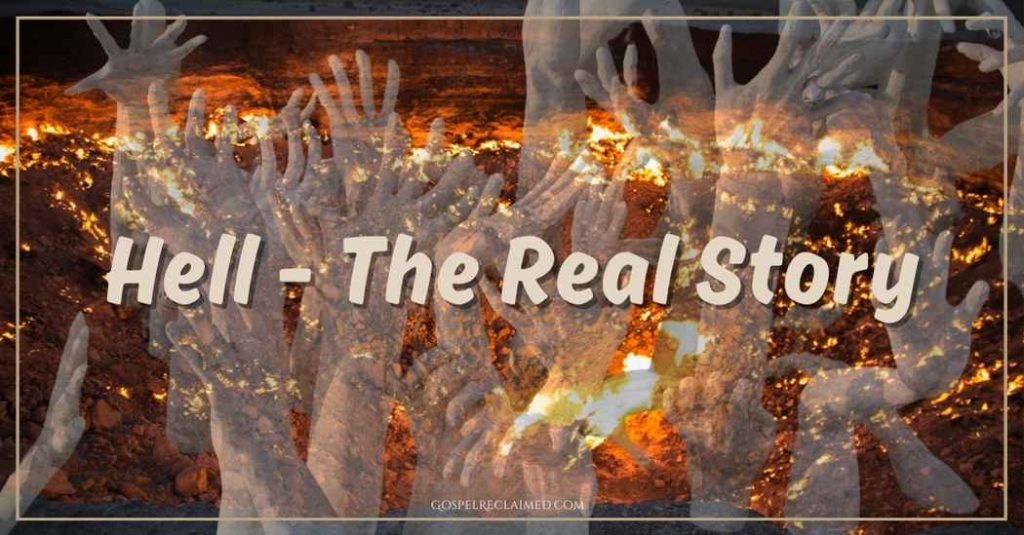⚠️ This blog isn’t about answers—it’s about awakening. Gospel Reclaimed is where I wrestle, wonder, and write about a gospel that’s far bigger, deeper, and more healing—a Father more faithful, a Savior more triumphant, and a Spirit more personal than religion ever taught me.
Let’s face it: if we read some of Jesus’ sayings literally, we end up with a religion that sounds more like a horror movie than good news.
Take John 6, for example.
“So Jesus said to them, “Truly, truly, I say to you, unless you eat the flesh of the Son of Man and drink his blood, you have no life in you. Whoever feeds on my flesh and drinks my blood has eternal life, and I will raise him up on the last day. For my flesh is true food, and my blood is true drink. Whoever feeds on my flesh and drinks my blood abides in me, and I in him.”
John 6:53-56 ESV
Cue the dramatic music.
Enter the confused disciples.
And, naturally, cue modern theologians turning this whole thing into a Eucharistic buffet with a side of spiritual cannibalism.
Now, don’t get me wrong, there’s rich, beautiful meaning in communion. But when people treat this one metaphor as ultra-literal and then turn around and call “carry your cross” a figure of speech, you’ve got to wonder… who’s picking the cherries here?
Let’s rewind.
The Jewish Context (aka Not Dracula’s Dinner Party)
To Jewish ears in the first century, Jesus wasn’t just being provocative for fun. (Though He did love a good spiritual mic drop.)
In Hebrew culture, the life of a creature was understood to be in its blood. That’s why the Law strictly forbade drinking blood. So when Jesus says “drink my blood,” He’s not suggesting they violate Leviticus with a vampire cosplay. He’s saying: “Drink of My Life. Let My Life Be In You.”
And “eating His flesh”? It’s not a gruesome dinner suggestion. It’s an invitation to feast on everything He is. His truth. His love. His way of being human.
Jesus was basically saying: “Let Me be your nourishment. Feed on who I am. Digest the truth of your identity in Me. Let Me sustain you.”
Why We Love Literalism? (Sometimes)
Let’s be honest—what Jesus said in John 6 isn’t that far off from other things He said.
The man loved metaphors. He wasn’t out here trying to start a doctrine spreadsheet. He used everyday, visual language to help real people grasp unseen spiritual truths.
Here’s a sampler plate:
“I am the vine, you are the branches.”
So should I start growing grapes out of my ears?“I am the good shepherd.”
Now, I don’t know about you, but I’m not out there chewing grass and saying “baaaa”! And yet, Jesus is my shepherd.
Jesus spoke in metaphors — vivid, powerful word-pictures that made transcendent truths tangible. Not to turn them into rigid rituals or spark 2,000 years of over-analyzing bread.
But here’s where things get really funny… We cherry-pick what we want to take literally.
Jesus says:
- “If your eye causes you to sin, gouge it out”
—Christians: Obviously symbolic. Don’t be dramatic.
- “Carry your cross”
—Christians: That’s about your annoying cowroker or your Wi-Fi speed.
“Hate your father and mother”
—Christians: Don’t take that out of context!
- “Be perfect as your heavenly Father is perfect”
—Christians: Well, He didn’t mean perfect-perfect, just try your best.
But when He says, “This is my body,” suddenly it’s full-on literal mode, holy whisper voice activated, theological eyebrows raised. And when He said, “Eat my flesh,” Christians were like:
Clearly literal! Set up the altar!
Seems like we’re not so much reading Scripture as we are editing it like a buffet menu:
Symbolic! ✔️
Metaphor! ✔️
Ooh, that one supports my theology—make it LITERAL and build an entire doctrine around it! ✔️
Jesus Was Always Talking About Life
The theme of life runs through all of Jesus’ teachings. Not just life as in “existence,” but zōē—the divine kind of life, life in its fullness, a life saturated with joy, peace, and righteousness.
When He spoke of eating and drinking, it wasn’t about digesting divinity. It was about receiving and participating in this abundant life.
He was telling people to feed on truth, to drink in grace, and to live from the source that would never run dry.
Feeding on Him = Nourishing our souls with truth, love, peace, joy—all that He is.
Drinking His blood = Taking in the life He poured out for us, receiving His divine kind of life (zōē aiōnios), and living in full trust of the unearned, unstoppable grace He gives.
It was never about a bite of bread turning into a bicep or a sip of wine becoming plasma. It was about union. Participation. Communion.
A Meal Worth Celebrating (Literally)
So what about the Lord’s Supper?
At the heart of it, the Last Supper wasn’t a magic ritual. It was a meal, a gathering of friends around a table. Jesus took bread and wine, elements of everyday life, and used them to paint a picture of the new reality they were stepping into:
Life in Him, and Him in them.
Paul would later say, “It is no longer I who live, but Christ who lives in me” (Galatians 2:20). That’s not poetry. That’s reality.
That’s what we remember when we break the bread and pour the wine:
That we live from everything He is.
That His life now flows in us.
That we don’t strive or perform—we simply partake.
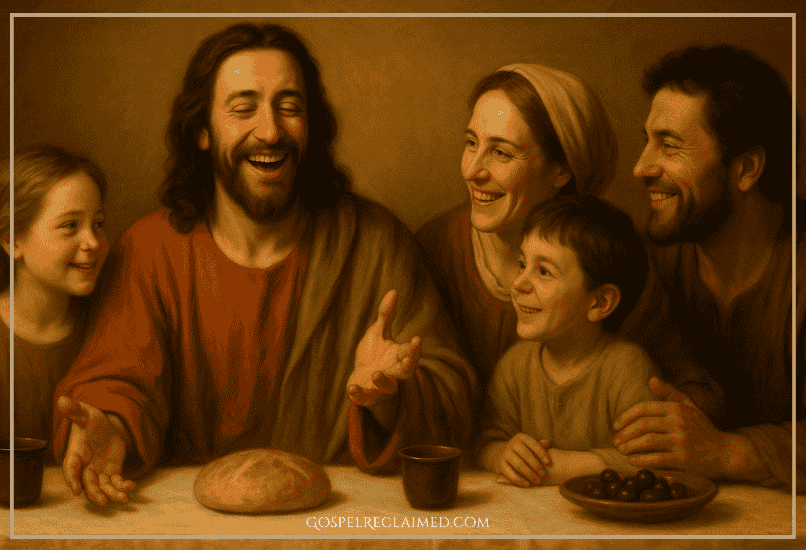
This isn’t a church-only event with special lighting and sad organ music. It’s not reserved for a once-a-month wafer-and-shot-glass ceremony.
You can break bread at your dinner table tonight with your spouse, your kids, your friends, over laughter, grilled meat, and maybe some sourdough and a glass of wine.
When we truly understand the Lord’s Supper, we stop seeing it as some holy obligation and start enjoying it as:
A living, breathing celebration of Christ’s literal life in us.
An everyday reminder that we are one with Him, like soul and body, indivisible.
No effort.
No magic.
Just union.
So, do we really eat Jesus?
Nope.
We live from Him.
And that’s way more satisfying than bread, anyway.
FAQs
What did Jesus mean when He said, “Eat my flesh and drink my blood”?
Jesus was basically saying: “Let Me be your nourishment. Feed on who I am. Digest the truth of your identity in Me. Let Me sustain you.”
Is the Lord’s Supper meant to be taken literally?
Jesus spoke in metaphors — vivid, powerful word-pictures that made transcendent truths tangible. Not to turn them into rigid rituals or spark 2,000 years of over-analyzing bread.
Can I celebrate communion at home with friends and family?
You can break bread at your dinner table tonight with your spouse, your kids, your friends, over laughter, grilled meat, and maybe some sourdough and a glass of wine.
